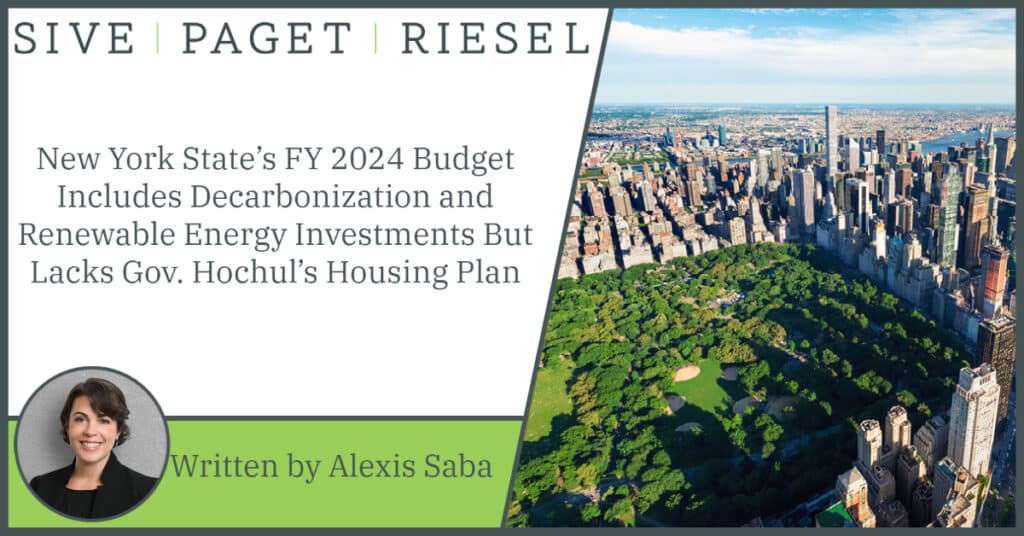Blog

New York State’s FY 2024 Budget Includes Decarbonization and Renewable Energy Investments But Lacks Gov. Hochul’s Housing Plan
On May 3, 2023, New York Governor Kathy Hochul announced the highlights of the approved Fiscal Year 2024 state budget, including numerous investments in decarbonization programs and renewable energy development. Notably absent from the budget are the elements of Governor Hochul’s housing plan, which included a commitment to build 800,000 new units in a decade and to replace the expired 421-a tax credit for affordable housing development.
The budget’s climate package includes the initial financial infrastructure to support an economy-wide Cap-and-Invest Program. Cap-and-Invest was identified in the December 2022 New York State Climate Action Council Scoping Plan as a key to implementing the Climate Leadership and Community Protection Act (CLCPA) by establishing a declining statewide cap on greenhouse gas emissions and then investing proceeds in programs that drive emissions reductions. The budget calls for the creation of two rebate program accounts—one for consumers and one for industrial small businesses—designed to direct certain proceeds to New Yorkers, along with a “Climate Investment Account,” which is designed to support clean energy and decarbonization programs, with a focus on disadvantaged communities. The budget also calls for an affordability study to evaluate ways to distribute rebates to consumers in an equitable manner and establishes labor standards for certain projects funded by the Climate Investment Account.
The budget also includes first-in-the-nation zero emission construction requirements for new buildings, including a ban on natural gas use in such buildings. The budget provisions follow New York City’s lead on building decarbonization with Local Law 154 of 2021, which effectively bans natural gas use in some buildings starting this year, and Local Law 97 of 2019, which sets greenhouse gas emissions limits for many of the City’s large buildings. The budget prohibits the installation of fossil fuel equipment (such as gas stoves) in new buildings seven stories or less beginning on December 31, 2025, and all other new buildings by December 31, 2028. There are notable exceptions, such as for emergency backup power, laundromats, laboratories, and hospitals.
Finally, the budget includes many components of the previously proposed Build Public Renewables Act, which, among other things, will enable the New York Power Authority (NYPA) to expand its renewable portfolio by building new renewable generation on its own or in partnership with private developers. The budget also requires NYPA to plan for the phase out of its “peaker” plants by 2030, which are often the most polluting power plants used to generate electricity when the demand peaks.
As for the scuttled housing plan, Governor Hochul sought to encourage housing development throughout the State by, among other things, requiring municipalities to achieve new home creation targets on a three-year cycle and to rezone areas around MTA rail stations for higher density. Governor Hochul also sought to develop a successor to the 421-a property tax exemption program that expired last year to encourage affordable housing development in New York City. These programs met resistance in the Legislature and did not make it into the final budget.